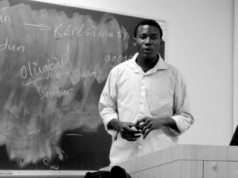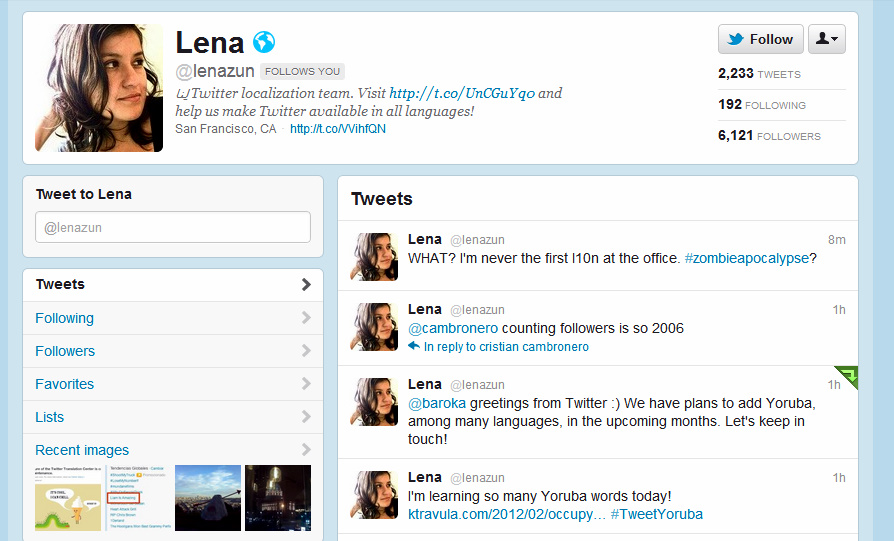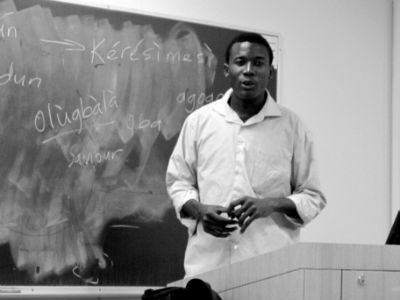An Interview with Yoruba Linguist, Kola Tubosun
10/07/2014In the first of our upcoming series of interviews with linguists and professionals working in or with Africa, we are delighted to bring you our interview with Nigerian writer and linguist, Kola Tubson.

Kola, perhaps could you start off by explaining what you do as a profession?
I am a writer and linguist. I currently edit a literary magazine on NigeriansTalk.org, called NTLitMag, and I work 9-5 at a not-for-profit educational institution in Lagos as a teacher of English.
Before that, I’d taught Yoruba at Southern Illinois University Edwardsville as a Fulbright Scholar, and English at the International Institute of St. Louis as an adult literacy volunteer for new immigrants in the United States. In my free time, I keep a travel blog, and work freelance as a literary and non-literary translator. I’m on the way into a PhD program in Linguistics.
What languages do you speak? Which languages do you translate into or from?
I speak Yoruba and English as first languages, and my work in translation is between these two languages. As a Nigerian, I also speak Pidgin English. However, I have learnt and speak to varying degrees French, Swahili, Igbo and Hausa.
Thinking about your main target language, what would you say are your biggest challenges when translating from English into that language?
The biggest, classical, problem in English to Yoruba translation is the problem of one-to-one equivalents. There are expressions in English that cannot be rendered with the same number of words in Yoruba (“I’m sorry” is one). There are also tones of those in Yoruba as well, that you can’t express in English without having to write an epistle. (“pẹlẹ” is one such, or “ẹ kú ilé).
It is a “problem” easily surmounted if the target text allows for it. But while translating for mobile communication, or computer/software jobs, it forces one to be creative, since the client usually requires one-to-one translation as much as possible, and there is usually not enough space to elaborate.
The other problem is that of diacritics – the fact that tone and vowel markings in Yoruba need to be present to avoid ambiguity. While most computers can be manipulated to place the tone marks on the translated words, many software may not be able to process them, and some clients don’t have need for them, so the translator is forced to send in products that are unsatisfactory and can cause ambiguity.
What challenges would you say translators in Nigeria or W. Africa face on a daily or regular basis?
Well, the absence of sufficient interest in the languages we work on might be one. That has changed over the last couple of years as a number of mobile and telecoms companies have included the language on their devices. The challenge is to show the languages we speak on the continent as important enough to include in these new devices, software, and services that are available for millions around the world. Yoruba, for instance, has over 30 million speakers worldwide. If that statistic isn’t enough to inspire investment from anyone willing to sell new products, then perhaps nothing will. But we need to become more visible and show that the language is capable of performing a public and useful role.
To answer your question specifically, I remember that one of the problems I had while starting out was finding jobs. Most translation jobs are posted on translation agency sites, and most online translation agencies ask you to be paying members before you can access those jobs. You have to pay with credit/debit cards, which many Nigerian translators don’t have. So that poses a problem of access. These days, with LinkedIn, it is slightly easier to get seen. But how many people go to LinkedIn to find translators?
The cost of internet access is also a big deal, if you want to work as a full time translator. You will need to make sure that you don’t spend everything you make on getting access to fast and reliable internet service.
I believe you are part of the #tweetYoruba movement on Twitter? Could you give us some insight into the aims of the movement and how it all came about?
There were a number of things that culminated in the first event. This was in 2012.
A few weeks in January, I believe – it could have been earlier – I had come across the news that Twitter had opened a translation centre for new languages. The aim of the centre was to find freelance translators willing to provide services to translate Twitter into new languages. I was impressed by it and thought that Yoruba stood a chance. I contacted the translation centre, and filled the form as a volunteer English-Yoruba translator. I was told that I would be contacted at some point. After many weeks of not hearing anything back, I got frustrated. I had a modest twitter following so I started thinking of ways to embarrass them into action.
However, on another day, I got into a fierce and passionate argument with a couple of young and upcoming Nigerians on twitter who believed that insistence on mother tongue education was a waste of time. The passion with which they presented their point moved me in a profoundly sad way. The cause of the argument was some news item that representatives in a state in Nigeria had passed a law to allow students study in their mother tongue, and for the business of government to be performed in Yoruba on certain days of the week. According to the young men, it was a waste of time and resources.
The counterargument I made, documented in this later blogpost, that countless research has shown that mother tongue education was the best form of education at the initial stages of a child’s life, never seemed to move the needle. Neither did examples of countries that don’t speak English but have managed to succeed in the world stage both in economics and other developmental indices. It boiled down, as I saw it, into the need to retain our attachment to the apron strings of our colonial conditioning. My arguments then wasn’t even that English be removed (because that would be stupid and also impractical), but that alongside, more attention should be placed on mother tongue education because of the high cost of allowing such languages to die while condemning out citizens to the bland world of foreign monolingualism for the rest of their lives.
In any case, then there came the Mother Tongue Day, sometime in February of that year. I had been on twitter, discussing with a few friends on the importance of mother tongue use. The idea just struck me that we could actually spend a day online tweeting only in Yoruba. It started as a joke. I suggested we do it the next day. Someone suggested that we push the day forward so as to get some time to publicise it. I agreed, and that was it. We chose March 1, and I prepared to use the day to also harass Twitter, so in the publicity, I told people that the aim was not just to tweet in Yoruba using the #tweetYoruba hashtag, but also to get Twitter to get its service into Yoruba. To do that, I encouraged people to use this other hashtag #twitterYoruba and copy all their tweets to either @twitter or @translator (the translation centre). We got someone to create a poster, and we publicized it. It worked, and we were pleasantly surprised. I never knew, until then, that we could get all of twitter to pay attention to Yoruba. It became a trending topic. We also got to twitter. A representative from the company replied to me publicly and promised to work with us to achieve that goal.

Since then, we just decided to name March 1 of every year the Tweet Yoruba Day where we not only tweet in Yoruba all day long, but celebrate the culture as well as the beauty of bilingualism everywhere.
This year, 2014, we launched the @tweetYoruba project, a twitter handle where one Yoruba speaker (chosen from applicants) tweets in Yoruba all for two weeks, about anything of his/her choice, and then hands over to another person, also chosen from twitter volunteers. Over time, we hope to form a strong community of interested tweeters, powerful enough to effect social or political change in the area of language use. This will not replace the annual TweetYoruba Day. It is planned as something that will ensure that after March 1, people don’t just forget and go back into their English/colonial/monolingual cocoons. There are a couple more projects planned for the future in this direction.
As a side note, Twitter still hasn’t delivered on that promise, and we haven’t stopped pestering them.
Do you think social media is helping or hindering the development of indigenous languages, either Nigeria specific or continent wide?
Social media is value neutral, I think. It’s like radio. Or television. They exist. Period. What becomes of them in the society is a function of what we allow them to become. I have seen a number of Kenyan tweeters who tweet only in Swahili, even on the English-only twitter portal. I have come across a few Hausa ones as well, though not as many as Kenyans. But the reason why we don’t have any full Yoruba twitter accounts is not the fault of social media (or Twitter itself, though I won’t pass up a chance to say that Twitter could have helped), but the result of a social conditioning of today’s people who believe that a monolingual world is not only inevitable, but desirable. That is a sad reality.
The reason why my contemporaries will decide not to pass down their own language to their children has nothing to do with social media, but their own inferiority complex. Social media, being value neutral, presents itself as a tool for either good or ill. If twitter exists in Yoruba, I’m pretty sure that my grandfather (a monolingual Yoruba man) will tweet. And that would be a great thing.
How important would you say it is for governments to protect and nurture indigenous languages?
VERY important. When a language dies, knowledge dies with it, along with a way of looking at the world. Unfortunately, politics has trumped common sense in many of these public policy decisions.
What advice would you give to foreign marketers coming into Nigeria and wanting to promote a product or service to the population?
Smart product makers and marketers already know the trick, and they are benefiting from it. There is need to have your product speak a language of the local population. I look forward to iPads and iPhones with Yoruba language modules/functions/services. Nokia is already ahead of the big names on this. The first mobile phones I came across in Nigeria with Igbo, Yoruba, and Hausa language functions was a Nokia. In 2005, I worked with on the first translation of T9 (now called Nuance) – a predictive text function on mobile phones – into Yoruba. Another colleague handled the Igbo part. I have not seen it in use, but I assume that the project didn’t end with our involvement. I have also worked on projects involving Samsung, also to translate their mobile platforms into Yoruba. I think that progress is being made. I hope that other foreign marketers are smart enough to work in that same direction. Yes, we speak English. But we’d like you better if you speak our languages.
How could the translation profession in Nigeria be improved?
Training? Funding? I don’t know. A professional body of translators might be nice, but I know a number of freelance translators that do a lot of great work. The benefit of a professional body will be their power to lobby governments towards particular ends. They might also have the power to provide training for intending translators, set a standard for professionals, facilitate exchange of ideas, and help procure good jobs.
If you could learn any new language, which would it be and why?
Mandarin would be great. Yoruba has three tone levels. I’ve been told that Mandarin has up to five or six. It will be nice to challenge myself a little bit more with that.
A massive thanks to Kola for his time and fantastic insights….

